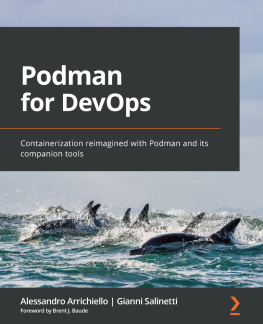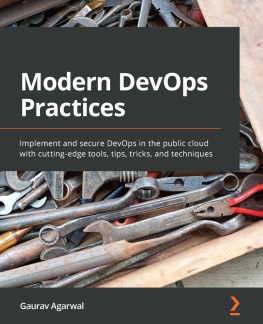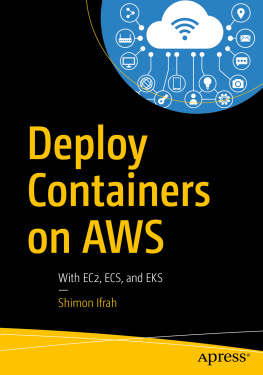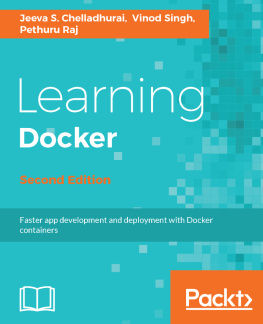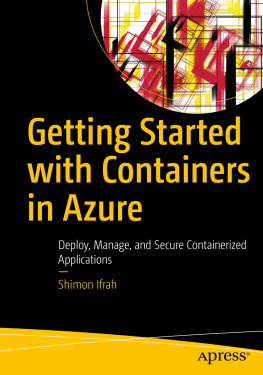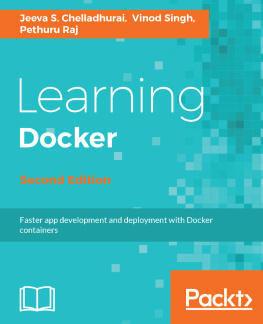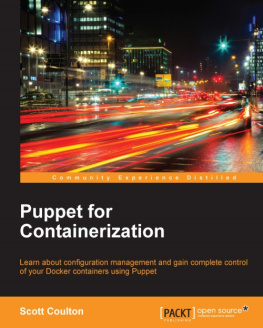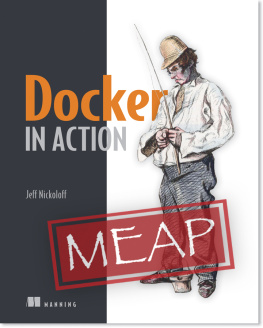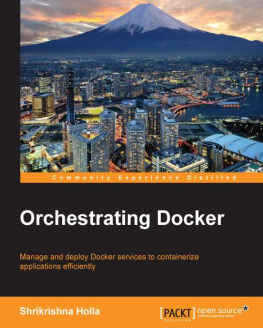Alessandro Arrichiello - Podman for DevOps: Containerization reimagined with Podman and its companion tools
Here you can read online Alessandro Arrichiello - Podman for DevOps: Containerization reimagined with Podman and its companion tools full text of the book (entire story) in english for free. Download pdf and epub, get meaning, cover and reviews about this ebook. year: 2022, publisher: Packt Publishing, genre: Computer. Description of the work, (preface) as well as reviews are available. Best literature library LitArk.com created for fans of good reading and offers a wide selection of genres:
Romance novel
Science fiction
Adventure
Detective
Science
History
Home and family
Prose
Art
Politics
Computer
Non-fiction
Religion
Business
Children
Humor
Choose a favorite category and find really read worthwhile books. Enjoy immersion in the world of imagination, feel the emotions of the characters or learn something new for yourself, make an fascinating discovery.
- Book:Podman for DevOps: Containerization reimagined with Podman and its companion tools
- Author:
- Publisher:Packt Publishing
- Genre:
- Year:2022
- Rating:5 / 5
- Favourites:Add to favourites
- Your mark:
Podman for DevOps: Containerization reimagined with Podman and its companion tools: summary, description and annotation
We offer to read an annotation, description, summary or preface (depends on what the author of the book "Podman for DevOps: Containerization reimagined with Podman and its companion tools" wrote himself). If you haven't found the necessary information about the book — write in the comments, we will try to find it.
Build, deploy, and manage containers with the next-generation engine and tools
Key Features- Discover key differences between Docker and Podman
- Build brand new container images with Buildah, the Podman companion
- Learn how to manage and integrate containers securely in your existing infrastructure
As containers have become the new de facto standard for packaging applications and their dependencies, understanding how to implement, build, and manage them is now an essential skill for developers, system administrators, and SRE/operations teams. Podman and its companion tools Buildah and Skopeo make a great toolset to boost the development, execution, and management of containerized applications.
Starting with the basic concepts of containerization and its underlying technology, this book will help you get your first container up and running with Podman. Youll explore the complete toolkit and go over the development of new containers, their lifecycle management, troubleshooting, and security aspects. Together with Podman, the book illustrates Buildah and Skopeo to complete the tools ecosystem and cover the complete workflow for building, releasing, and managing optimized container images. Podman for DevOps provides a comprehensive view of the full-stack container technology and its relationship with the operating system foundations, along with crucial topics such as networking, monitoring, and integration with systemd, docker-compose, and Kubernetes.
By the end of this DevOps book, youll have developed the skills needed to build and package your applications inside containers as well as to deploy, manage, and integrate them with system services.
What you will learn- Understand Podmans daemonless approach as a container engine
- Run, manage, and secure containers with Podman
- Discover the strategies, concepts, and command-line options for using Buildah to build containers from scratch
- Manage OCI images with Skopeo
- Troubleshoot runtime, build, and isolation issues
- Integrate Podman containers with existing networking and system services
The book is for cloud developers looking to learn how to build and package applications inside containers and system administrators who want to deploy, manage, and integrate them with system services and orchestration solutions. This book provides a detailed comparison between Docker and Podman to aid you in learning Podman quickly.
Table of Contents- Introduction to Container Technology
- Comparing Podman and Docker
- Running the First Container
- Managing Running Containers
- Implementing Storage for the Containers Data
- Meet Buildah Building Containers from Scratch
- Integrating with Existing Application Build Processes
- Choosing the Container Base Image
- Pushing Images to a Container Registry
- Troubleshooting and Monitoring Containers
- Securing Containers
- Implementing Container Networking concepts
- Docker Migration Tips and Tricks
- Interacting with systemd and Kubernetes
Alessandro Arrichiello: author's other books
Who wrote Podman for DevOps: Containerization reimagined with Podman and its companion tools? Find out the surname, the name of the author of the book and a list of all author's works by series.

